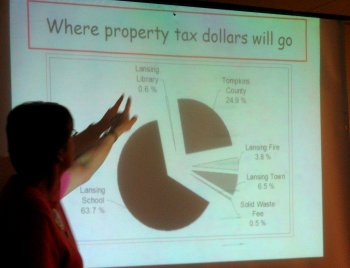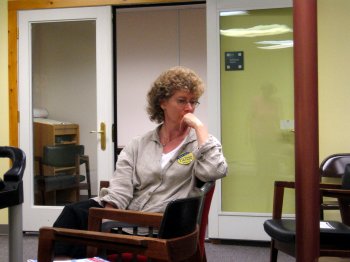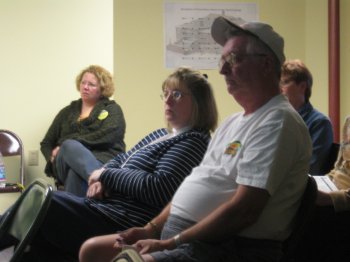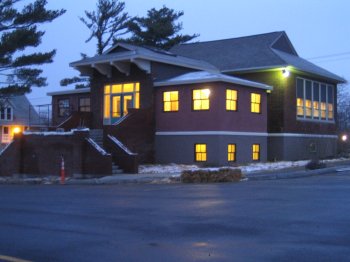- By Dan Veaner
- News
 Print
Print  For approximately the cost of one book per year you can fund a library in Lansing, and bring Lansing taxes back into the town. The newly refurbished Lansing Community Library Center (LCLC) is entirely paid for, and is a gift to the community. Now it's time to take it to the next level with a very small (17 cents per thousand of assessed value) tax that will enable the hiring of a professional certified librarian, and make the facility eligible for County and State dollars. That is the message library volunteers hope voters will get when they decide whether to approve the establishment of a school district library on May 15.
For approximately the cost of one book per year you can fund a library in Lansing, and bring Lansing taxes back into the town. The newly refurbished Lansing Community Library Center (LCLC) is entirely paid for, and is a gift to the community. Now it's time to take it to the next level with a very small (17 cents per thousand of assessed value) tax that will enable the hiring of a professional certified librarian, and make the facility eligible for County and State dollars. That is the message library volunteers hope voters will get when they decide whether to approve the establishment of a school district library on May 15."Volunteers like to say that our renovated new building is a gift to Lansing," said Fund Raising Committee member Donna Scott. "The roof, the utilities, even the old part is refurbished, so it is good to go for many years to come. We just completed a $385,000 addition paid for by voluntary donations. The building is completely debt free. There's no mortgage. Your friends and neighbors worked six years to give this to you."
Only two residents not affiliated with the library came to the public meeting, but library officials were optimistic, saying that public meetings of this sort rarely draw a crowd. And volunteers have been actively getting the word out in other ways, including district-wide mailings, letters to the media, yard signs, and radio appearances, among other outreaches.

Volunteer Donna Scott illustrates that the charter will only cost a
0.6% sliver of the total property tax pie for Lansing taxpayers
Scott explained what a charter is and what benefits chartering the library will bring to Lansing. Currently LCLC's official status is that of reading room of the Tompkins County Public Library (TCPL). A charter will make it autonomous and eligible to receive yearly income from Tompkins County and New York State, as well as grant money it does not qualify for as a reading room. The income from the tax will enable the library to hire a certified librarian who would also take over the coordination of the volunteers and provide services that volunteers are not qualified to offer. And supporters say that an autonomous Lansing library will enhance property values.
It will also mean expanding library hours from the current 24 to a minimum of 35, which is mandated by the conditions of a charter. And it would bring services to the community. LCLC would become a member of the Finger Lakes Library System. "That would enable us to be able to get books from any other library in the system," said publicity volunteer Bobbi Wasenko. "This is going to be something that will be another positive for us as an independent library."

LCLC Chairwoman Marlaine Darfler
Scott said that LCLC is asking the community for a charter now because it is increasingly more difficult to provide services the community demonstrably wants with volunteers, some of whom are beginning to burn out. "Fund raising by volunteers has just become too difficult," Scott said. "We've done very well, but many of the sources for significant donations are drying up and the same eight to ten people have been doing the fund raising for this library for over six years and some of those people are starting to drop away."
LCLC Chairwoman Marlaine Darfler has said that it was always part of the eventual plan to ask for a charter, but that the library volunteers wanted to do it right by upgrading the building, building the collection, and establishing services and programs before asking for taxpayer support. Nobody argues that the library has been fiscally responsible, operating in the black for its six years and paying cash for two capital improvement projects. But supporters face serious hurdles in an environment in which taxpayers are saying that property taxes are already too high. Another hurdle is the linkage with the school district and a common misconception that LCLC would be a part of the school system if voters approve.

Library supporters were undaunted by a low turnout
The misconception stems from the only actual link between the two. LCLC could have chosen to apply for a municipal charter that would have shared a boundary with the Town of Lansing, but settled on a school charter. This means that the library district will share a geographical boundary (and its taxpayers) with the school district, but nothing else except that the school district actually collects the tax for the library. "The big reason we pushed for a school charter is that after this vote we can vote again every year here at no cost," explained Darfler. "If we do it through the town the vote becomes expensive and a lot of work."
The confusion may also come from the library vote appearing on the May 15 school ballot. But supporters say this is another instance of LCLC's fiscal responsibility, saving the thousands of dollars it would cost for a separate vote.
Unfortunately for the library, the school district is going through a very rough patch with voters. After last year's budget was voted down and a $20 million capital project was defeated by only 16 votes the school board faces a depressing prospect of asking the public to approve a budget this year that will add 7.38% to the tax levy in an atmosphere of rising property valuations that will mean a big jump in school taxes for Lansing residents. The rise is this high because of a combination of an error in projecting spending that resulted in $400,000 less State aid than anticipated and a past policy of using reserves to artificially lower school tax rises. With dwindling contingency funds that that policy is no longer viable, so the rise this year appears even larger because it was less in recent years. School board members have acknowledged that one of their top challenges going forward is to regain the public's trust.

And that poses two hurdles for the library charter. The first is the perceived linkage with the school district. And the second is that taxes are already going up so much that taxpayers are thinking twice about approving a new taxing authority. The school budget will likely pass, because if it fails a State enforced contingency budget will cost Lansing taxpayers even more. And taxpayers are also facing upcoming municipal projects such as the sewer and a new firehouse.
But volunteers were optimistic, making the point that they are asking for a relatively miniscule amount from taxpayers. They certainly have a lot to be proud of, having provided a beautifully updated facility to Lansing at no cost to taxpayers. Holding the meeting in the library's new art exhibit / meeting room was the best illustration of how much they have accomplished. And by operating LCLC in a fiscally responsible and conservative manner for six years, they hope the public will trust them to continue doing so in the future. "We've paid for everything along the way," Darfler said. "And stayed in the black."
----
v3i17



